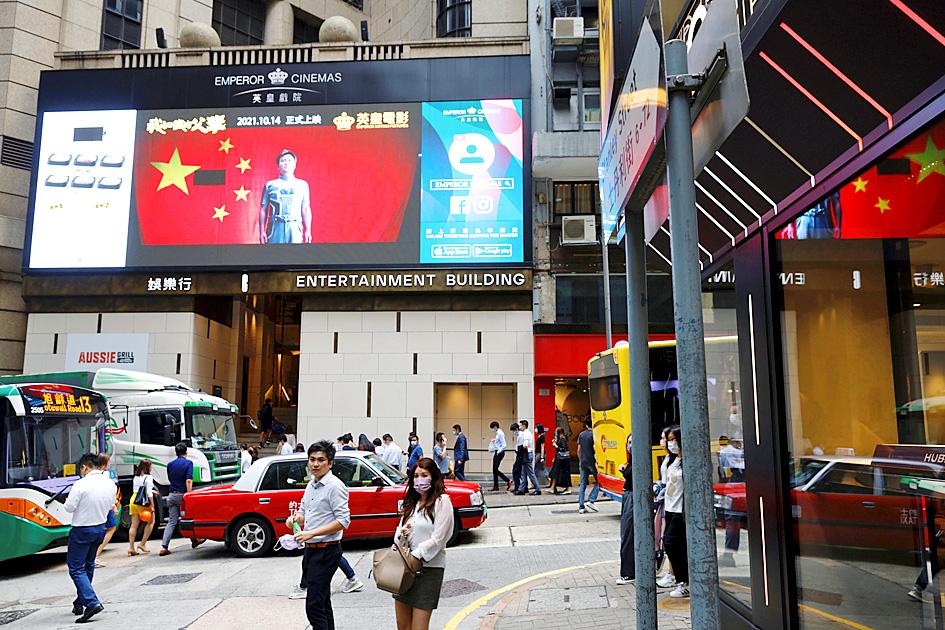Hong Kong yesterday banned films that run contrary to the interests of its National Security Law, the latest crackdown on freedom of expression in the territory.
The Hong Kong Legislative Council amended the Film Censorship Bill, turning movie censors into gatekeepers of the law with penalties as high as HK$1,000,000 (US$128,569) and three years in prison for those who screen non-approved content.
Inspectors can search without a warrant a premises showing a film, including company offices or a private members’ club, and the Hong Kong Film Censorship Authority can demand more information about screenings.

Photo: Reuters
Questions hang over how the changes will affect streaming services such as Netflix Inc, which offers a documentary on right advocate Joshua Wong (黃之鋒) in Hong Kong.
Netflix declined to comment, while Vimeo Inc, Amazon.com Inc and Apple Inc did not reply to questions about the changes.
“It is a treacherous climate for businesses having to make content decisions,” said Darrell West, senior fellow at the Center for Technology Innovation at the Brookings Institution.
The changes are part of a wider legal assault on the freedom of expression and information once prized in the former British colony, but severely reduced in mainland China.
Hong Kong Chief Executive Carrie Lam (林鄭月娥) said that the Legislative Council had “delivered a brilliant performance,” as all of the political opposition had either been arrested, disqualified or resigned after Beijing mandated that national security officials approve candidates.
“They have done really well in terms of legislative amendments and proposals,” Lam said in a regular news briefing on Tuesday.
Baking such censorship into law were “dictatorial maneuvrings designed to undermine a vibrant Hong Kong film culture,” said Joseph Tse-Hei Lee (李榭熙), director of the Global Asia Institute at Pace University in New York, who has published two papers on Hong Kong cinema.
After decades producing global movie stars such as Tony Leung (梁朝偉), some in the film industry worried that the amendments signaled the “death of Hong Kong cinema,” Lee said.
“It is hard to imagine how film directors, executive producers and actors could stay politically neutral because China’s definition of politics focuses narrowly on any opinion and action thought to be a security threat,” he said.

SECURITY: As China is ‘reshaping’ Hong Kong’s population, Taiwan must raise the eligibility threshold for applications from Hong Kongers, Chiu Chui-cheng said When Hong Kong and Macau citizens apply for residency in Taiwan, it would be under a new category that includes a “national security observation period,” Mainland Affairs Council (MAC) Minister Chiu Chui-cheng (邱垂正) said yesterday. President William Lai (賴清德) on March 13 announced 17 strategies to counter China’s aggression toward Taiwan, including incorporating national security considerations into the review process for residency applications from Hong Kong and Macau citizens. The situation in Hong Kong is constantly changing, Chiu said to media yesterday on the sidelines of the Taipei Technology Run hosted by the Taipei Neihu Technology Park Development Association. With

A US Marine Corps regiment equipped with Naval Strike Missiles (NSM) is set to participate in the upcoming Balikatan 25 exercise in the Luzon Strait, marking the system’s first-ever deployment in the Philippines. US and Philippine officials have separately confirmed that the Navy Marine Expeditionary Ship Interdiction System (NMESIS) — the mobile launch platform for the Naval Strike Missile — would take part in the joint exercise. The missiles are being deployed to “a strategic first island chain chokepoint” in the waters between Taiwan proper and the Philippines, US-based Naval News reported. “The Luzon Strait and Bashi Channel represent a critical access

‘FORM OF PROTEST’: The German Institute Taipei said it was ‘shocked’ to see Nazi symbolism used in connection with political aims as it condemned the incident Sung Chien-liang (宋建樑), who led efforts to recall Democratic Progressive Party (DPP) Legislator Lee Kun-cheng (李坤城), was released on bail of NT$80,000 yesterday amid an outcry over a Nazi armband he wore to questioning the night before. Sung arrived at the New Taipei City District Prosecutors’ Office for questioning in a recall petition forgery case on Tuesday night wearing a red armband bearing a swastika, carrying a copy of Adolf Hitler’s Mein Kampf and giving a Nazi salute. Sung left the building at 1:15am without the armband and apparently covering the book with a coat. This is a serious international scandal and Chinese

COUNTERINTELLIGENCE TRAINING: The ministry said 87.5 percent of the apprehended Chinese agents were reported by service members they tried to lure into becoming spies Taiwanese organized crime, illegal money lenders, temples and civic groups are complicit in Beijing’s infiltration of the armed forces, the Ministry of National Defense (MND) said in a report yesterday. Retired service members who had been turned to Beijing’s cause mainly relied on those channels to infiltrate the Taiwanese military, according to the report to be submitted to lawmakers ahead of tomorrow’s hearing on Chinese espionage in the military. Chinese intelligence typically used blackmail, Internet-based communications, bribery or debts to loan sharks to leverage active service personnel to do its bidding, it said. China’s main goals are to collect intelligence, and develop a